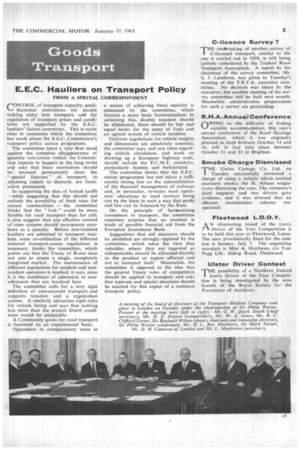E.E.C. Hauliers on Transport Policy
Page 7

If you've noticed an error in this article please click here to report it so we can fix it.
FROM A SPECIAL CORRESPONDENT
CONTROL of transport capacity, qualificational restrictions for people seeking entry into transport, anti the regulation of transport prices and conditions are supported by the E.E.C. hauliers' liaison committee. This is made clear in comments which the committee has made about the E.E.C. Commission's transport policy action programme.
The committee takes a very firm stand against the complete disappearance of quantity restrictions (which the Commission expects to happen in the long term) and asks that these restrictions should be retained permanently since the special features " of transport. in adjusting supply to demand, are themselves permanent.
In supporting the idea of forked tariffs —while suggesting that this should not exclude the possibility of fixed rates for certain commodities — the committee thinks that the "fork " could be more flexible for road transport than for rail; it also suggests that any effective control of rates systems should incorporate sanctions as a penalty. Before non-resident hauliers are admitted to transport markets, some co-ordination of the different national transport-access regulations is necessary, thinks the committee, which points out that the Treaty of Rome does not aim to create a single, completely integtated market. The maintenance of different regulations for resident and nonresident operators is implied, it says, since it is the conditions of admission or nonadmission that are involved here.
The committee calls for a very tight definition of own-account transport, and supports taxation and a registration system. It similarly advocates rigid rules for vehicle hiring and says that nothing less strict than the present Dutch conditions would be acceptable.
A Community quota for road transport is favoured on an experimental basis. Opposition to compensatory taxes as a means of achieving fiscal equality is reiterated by the committee, which favours a more basic harmonization; in achieving this, double taxation should be eliminated, there should be fair and equal terms for the entry of fuels and an agreed system of vehicle taxation.
Uniform regulations for vehicle weights and 'dimensions are absolutely essential, the committee says, and any rules regarding vehicle circulation, and work on drawing up a European highway code, should include the E.C.M.T. countries, particularly Austria and Switzerland.
The committee thinks that the E.E.C. action programme has not taken a sufficiently strong line on the rationalization of the financial management of railways and, _M particular, re-states road operators' objections to road services being run by the State in such a way that profit and loss can be balanced by the State.
On the principle of harmonizing investment in transport, the committee expresses surprise that no mention is made of possible financial aid from the European Investment Bank.
Suggestions that aid measures should be abolished are strongly opposed by the committee, which takes the view that subsidies, where they are regarded as indispensable, should be allocated directly to the product or region affected and net to transport itself. Meanwhile, the committee is opposed to the idea that the general Treaty rules of competition should be applied to transport and asks that separate and special measures should be enacted for this aspect of a common transport policy.
















































































































